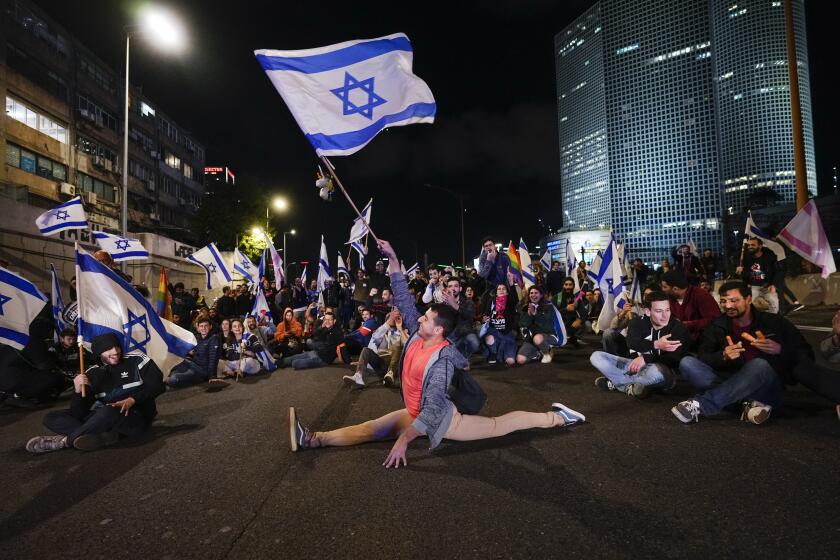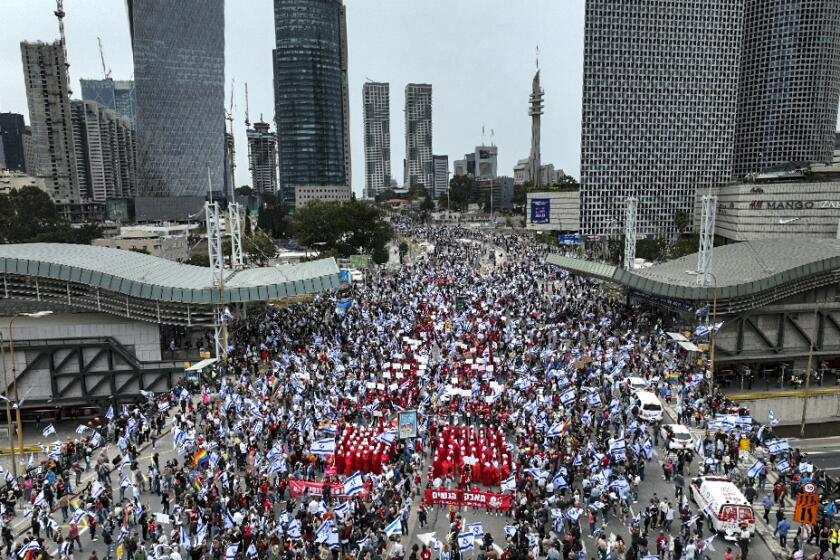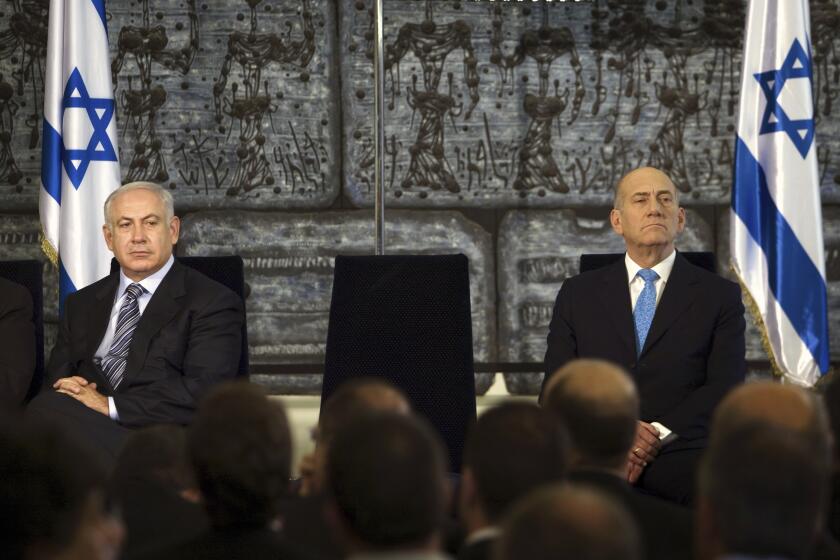Netanyahu delays controversial judicial overhaul after mass protests in Israel
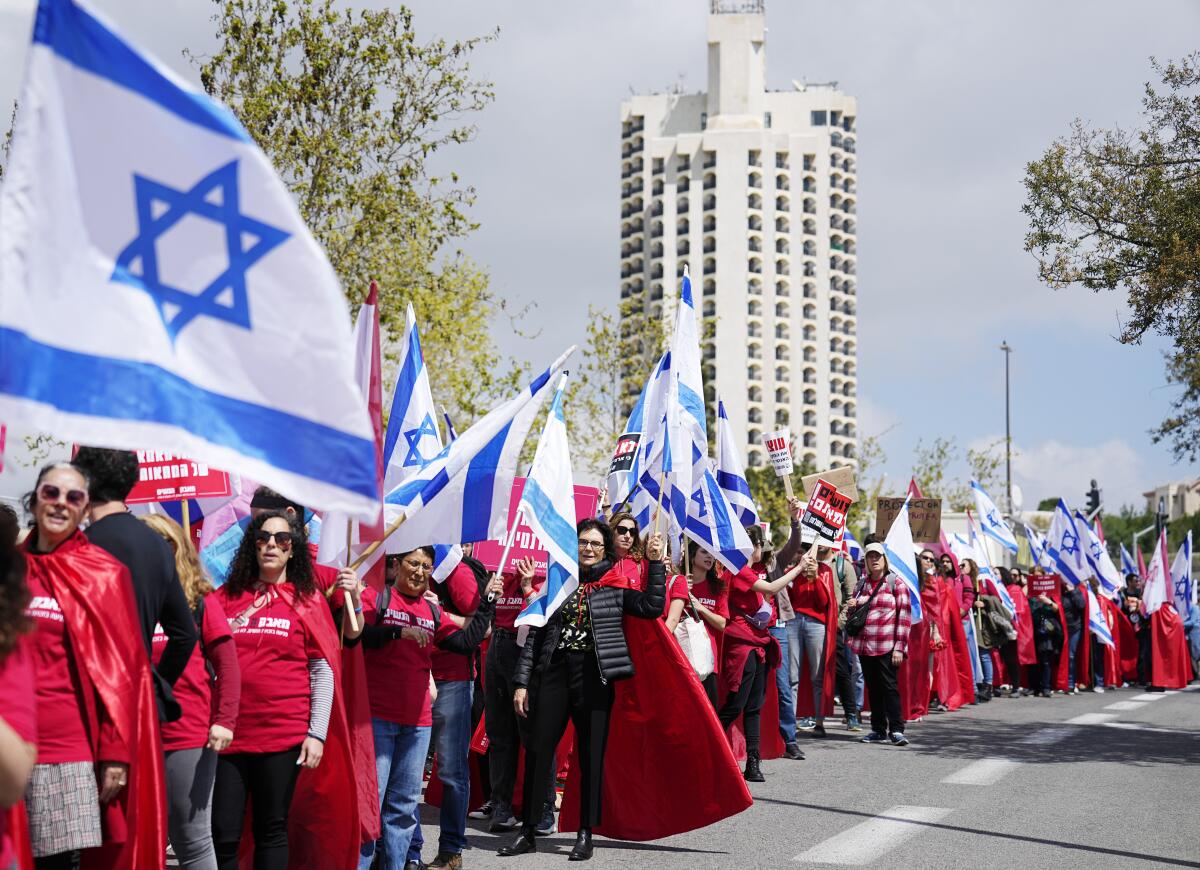
- Share via
JERUSALEM — Israeli Prime Minister Benjamin Netanyahu announced a delay in his judicial overhaul plan Monday, saying he wanted to give himself and his political opponents time to seek a compromise over the contentious package.
Netanyahu made the announcement after two days of large protests against the plan.
“When there’s an opportunity to avoid civil war through dialogue, I, as prime minister, am taking a timeout for dialogue,” Netanyahu said in a nationally televised address.
Striking a more conciliatory tone than in previous speeches, he said he was determined to pass a judicial reform but called for “an attempt to achieve broad consensus.”
Immediately after Netanyahu’s statement, the head of the country’s largest trade union said it would call off a general strike that threatened to grind Israel’s economy to a halt.
Netanyahu spoke after tens of thousands of Israelis demonstrated outside parliament and workers launched a nationwide strike Monday in a dramatic escalation of the mass protests aimed at halting his plan.
Crisis in Israel deepens over the new government’s radical plans, which have alienated and dismayed Israelis and Jewish Americans alike.
The chaos shut down much of the country and threatened to paralyze the economy. Departing flights from the main international airport were grounded. Large mall chains and universities closed their doors, and Israel’s largest trade union called for its 800,000 members to stop work in healthcare, transit, banking and other fields.
Diplomats walked off the job at foreign missions, and local governments were expected to close preschools and cut other services. The main doctors union announced that its members would also strike.
The growing resistance to Netanyahu’s plan came hours after tens of thousands of people burst into the streets around the country in a spontaneous show of anger at the prime minister’s decision to fire his defense minister after he called for a pause to the overhaul. Chanting, “The country is on fire,” they lit bonfires on Tel Aviv’s main highway, closing the thoroughfare and many others throughout the country for hours.
Demonstrators gathered again Monday outside the Knesset, or parliament, turning the streets surrounding it and the Supreme Court into a roiling sea of blue-and-white Israeli flags dotted with rainbow Pride banners. Large demonstrations in Tel Aviv, Haifa and other cities drew thousands more.
“This is the last chance to stop this move into a dictatorship,” said Matityahu Sperber, 68, who joined a stream of people headed to the protest outside the Knesset. “I’m here for the fight to the end.”
Netanyahu spent the day in consultations with his aides and coalition partners before announcing the delay. Earlier, some members of his Likud party said they would support the prime minister if he heeded calls to halt the overhaul.
National Security Minister Itamar Ben-Gvir, who has been one of the strongest proponents of the plan, announced after meeting with the prime minister that he had agreed to a delay of at least a few weeks.
He said Netanyahu had agreed to bring the legislation for a vote when parliament reconvenes for its summer session on April 30 “if no agreements are reached during the recess.”
Netanyahu gave no timeline for a compromise to be reached in his speech, but expressed hope that the nation would heal and that people would enjoy the upcoming Passover holiday.
The speech appeared to calm tensions, but it did not resolve the underlying discontent behind the protests. Even before he spoke, the grassroots anti-government protest movement said a delay would not be enough.
“A temporary freeze does not suffice, and the national protests will continue to intensify until the law is rejected in the Knesset,” organizers said.
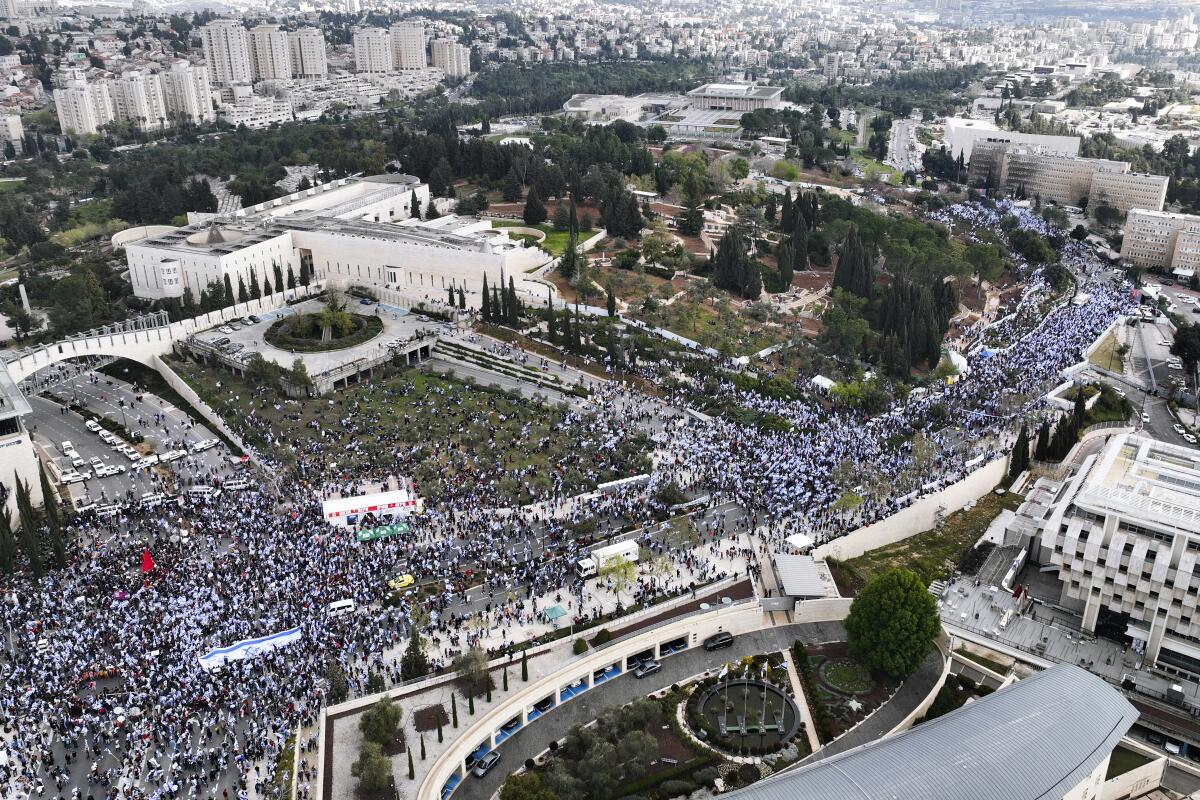
The overhaul, driven by Netanyahu, who is on trial for corruption, and his allies in Israel’s most right-wing government ever has plunged Israel into one of its worst domestic crises. It has sparked a sustained and intensifying protest movement that has galvanized nearly all sectors of society, including its military, where reservists have increasingly come out publicly to say they will not serve a country veering toward autocracy.
Israel’s Palestinian citizens, however, have largely sat out the protests. Many say Israel’s democracy is tarnished by its military rule over their brethren in the West Bank and the discrimination Palestinians face.
The turmoil has magnified longstanding and intractable differences over Israel’s character that have riven it since the country was founded. The protesters say they are fighting for the very soul of the nation, saying the overhaul will remove Israel’s system of checks and balances and directly challenge its democratic ideals.
The government has labeled them as anarchists out to topple a democratically elected leadership and says the plan will restore balance between the judicial and executive branches by reining in an interventionist court with liberal sympathies.
Israel’s parliament has passed the first of several laws proposed as part of a contentious judicial overhaul that has sparked massive public protests.
At the center of the crisis is Netanyahu himself, Israel’s longest-serving leader, and the lengths he may be willing to go to maintain his grip on power, even as he battles the corruption charges of fraud, breach of trust and accepting bribes in three separate affairs. He denies wrongdoing.
On Monday afternoon, Netanyahu issued his first statement since he fired Defense Minister Yoav Gallant, urging against violence ahead of a planned counterprotest in Jerusalem organized by ultranationalist supporters of the judicial overhaul.
Some 20,000 right-wing Israelis attended the counterdemonstration, which also took place near parliament and passed without violence.“They won’t steal the election from us,” read a flier for event, organized by the Religious Zionist party.
“I call on all protesters in Jerusalem, right and left, to behave responsibly and not act violently,” Netanyahu wrote on Twitter.
The firing of his defense minister, at a time of heightened security threats in the West Bank and elsewhere, appeared to be a last straw for many, including apparently the Histadrut, the country’s largest trade union umbrella group, which had sat out the months-long protests before the defense minister’s firing.
“Where are we leading our beloved Israel? To the abyss,” Arnon Bar-David, the union group head, said in a rousing speech to applause. “Today we are stopping everyone’s descent toward the abyss.”
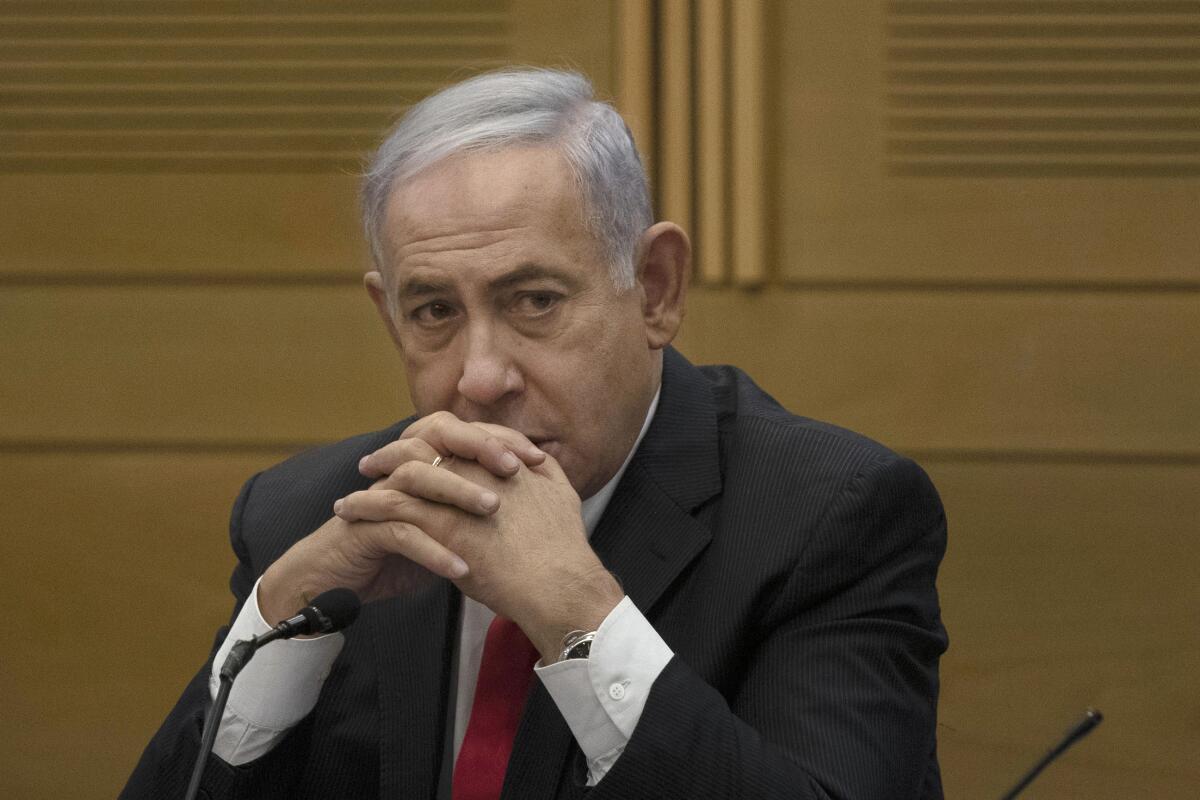
On Monday, as the embers of the highway bonfires were being cleared, Israel’s ceremonial president, Isaac Herzog, urged Netanyahu to immediately halt the overhaul.
“The entire nation is rapt with deep worry. Our security, economy, society — all are under threat,” he said. “Wake up now!”
Opposition leader Yair Lapid said the crisis was driving Israel to the brink.
“We’ve never been closer to falling apart. Our national security is at risk, our economy is crumbling, our foreign relations are at their lowest point ever, we don’t know what to say to our children about their future in this country,” Lapid said.
Start your day right
Sign up for Essential California for the L.A. Times biggest news, features and recommendations in your inbox six days a week.
You may occasionally receive promotional content from the Los Angeles Times.
The developments were being watched in Washington, which is closely allied with Israel yet has been uneasy with Netanyahu and the far-right elements of his government. The U.S. is “deeply concerned” by the developments in Israel, “which further underscore the urgent need for compromise,” National Security Council spokesperson Adrienne Watson said in a statement.
The architect of the plan, Justice Minister Yariv Levin, a popular party member, had long promised he would resign if the overhaul was suspended. But on Monday, he said he would respect the prime minister’s decision should he halt the legislation.
A former Israeli prime minister is urging world leaders to shun the current one, Benjamin Netanyahu, over his plan to overhaul the justice system.
Netanyahu’s dismissal of Gallant, the defense minister, appeared to signal that he and his allies would press ahead. Gallant was the first senior member of Likud to speak out against it, saying the deep divisions were threatening to weaken the military.
And Netanyahu’s government forged ahead with a centerpiece of the overhaul — a law that would give the governing coalition the final say over all judicial appointments. A parliamentary committee approved the legislation on Monday for a final vote, which could come this week.
The government also seeks to pass laws that would would grant the Knesset the authority to overturn Supreme Court decisions and limit judicial review of laws.
A separate law that would circumvent a Supreme Court ruling to allow a key coalition ally to serve as minister was delayed following a request from that party’s leader.
More to Read
Sign up for Essential California
The most important California stories and recommendations in your inbox every morning.
You may occasionally receive promotional content from the Los Angeles Times.
